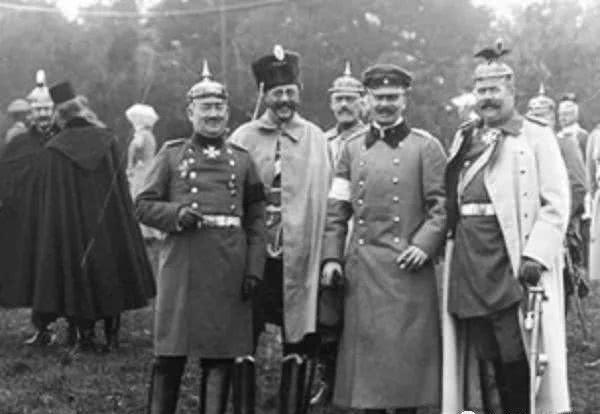When it comes to austria-Hungary, many friends probably associate it with modern Austria. But Austria, though closely linked to Austria-Hungary, was completely unequal. As can be seen from the name, the Austro-Hungarian Empire was a "dual empire" formed by the combination of Austria and Hungary.

But Hungary was already nominally independent in 1867, but the Hungarian king was concurrently held by the Austrian Habsburg family, which led to the "dynastic union" between Hungary and Austria. 100 years ago, the Austro-Hungarian Empire was the undisputed power and power of Europe, a powerful European empire with 620,000 square kilometers and a population of 52 million.
In terms of economy, Austria-Hungary reached about $63 billion in total economic output around 1900, ranking fifth in Europe at the time after Britain, Germany, France and Russia. But the top four countries, in addition to Germany's relatively few overseas colonies, Britain and France have tens of millions of square kilometers of global colonies, while Russia is the main body of the territory located in Asia, so if you according to the economic strength of the European continent, austria-Hungary is almost one of the best in the European continent.
The strength of the Austro-Hungarian Empire in its early years to drive Russia out of the Balkans is undoubtedly something that no European power can underestimate. The rulers of the Austro-Hungarian Empire were a very old Family of Europe, called the Habsburgs, a family with a long history of culture that had been firmly in control of Austria until World War I.
Its six-hundred-year reign was even longer than many of China's dynasties, but it was eventually divided among five other European countries after World War I, when the Austro-Hungarian Empire occupied a very large area, controlled as many as seven regions, and these people had different cultures, and this fatal factor doomed the empire to escape the catastrophe of the First World War.
The trigger of the First World War: the events of Sarajevo at first appeared to be nothing more than a regional struggle, and the news of the assassination of Archduke Franz Ferdinand and his wife in the Austro-Hungarian Empire did not even arouse the interest of the European press at the time. But it provoked an extreme reaction from the Austro-Hungarian government, after which the crisis spread rapidly, involving almost all the European powers in just four weeks.
The Austro-Hungarian Empire was relatively powerful at the outbreak of The First World War, and during the First World War, the heavy artillery units of the Austro-Hungarian Army were very well equipped, but their logistics and supplies were not good, and they could not make good use of railway transportation, and the most fatal thing was that due to the integration of multiple ethnic groups, even the language was not understood, resulting in the Austro-Hungarian Army's unevenness.
The official languages of the Austro-Hungarian Empire during World War I were two: German and Hungarian. However, there are many more populous peoples in the country, and there are as many as two dozen common languages in the empire, in other words, the people in the empire have difficulty communicating with each other, and it is said that only the emperor of the Austro-Hungarian Empire can use all the languages in the empire, and the others will only have a few languages at most.
Linguistic inconsistency also plagued the Austro-Hungarian army, which was eventually divided into German-speaking and Hungarian-speaking armies. All the soldiers recruited from the Hungarian regions were incorporated into the Hungarian-speaking legions, even if they were Romanians, Poles, Croats, or Slovenes who did not know Hungarian at all.
Soldiers recruited from outside Hungary were all incorporated into the Austro-Hungarian German Legion, even if they were Czechs, Slovaks, and Italians who did not know German at all. At that time, because of the large population of Germans and Hungary, and the absence of large-scale wars, the language shortcomings of their armies were not really highlighted.
However, the scale of the First World War was far greater than the upper echelons of the Austro-Hungarian Empire imagined, and the army had to be mobilized nationwide, so that a large number of soldiers who did not know German and Hungarian at all were incorporated into the Austro-Hungarian army, while most of the grass-roots officers of the Austro-Hungarian Empire could only speak German and Hungarian.
So the problem arises, Austro-Hungarian officers often give orders on the battlefield, and the soldiers do not understand! Many of the soldiers under them could not understand what the officers said, and it was difficult for the soldiers to cooperate with each other, and many of them could not communicate with their comrades-in-arms. The powerful Austro-Hungarian army often paralyzed the grass-roots command due to the lack of language uniformity, and the combat effectiveness of the army was naturally greatly weakened.
Therefore, the Austro-Hungarian army performed poorly throughout world war I, and did not even have a strategic plan, where the front line was drawn! On the whole, the performance is only better than the Italian army, and there is still a very large gap against military powers such as Britain, France and Germany.
World War I directly led to the rapid decline of the Austro-Hungarian Empire, and by 1918, the Austro-Hungarian Empire's foreign wars were becoming more and more fierce, and the imperial top brass was unable to unite this multi-ethnic empire and eventually disintegrated after the defeat in World War I. Although that tragic war is far away, we should remember history and cherish the peaceful life now! May the world have less smoke and more smiling faces!